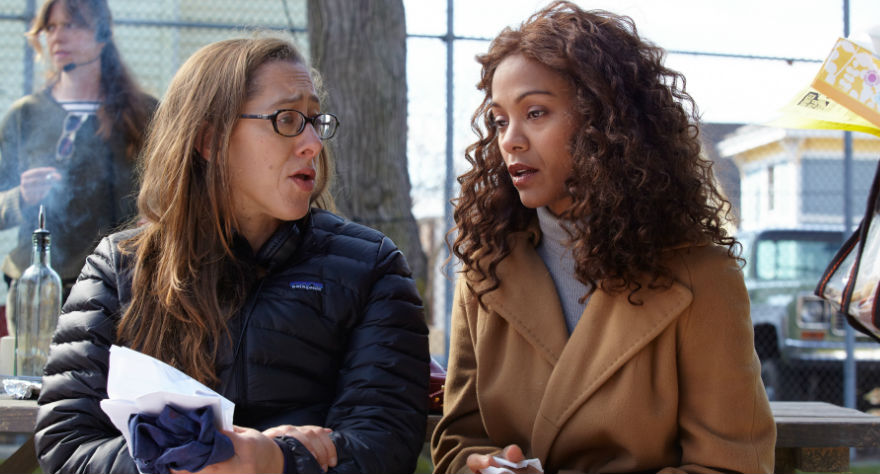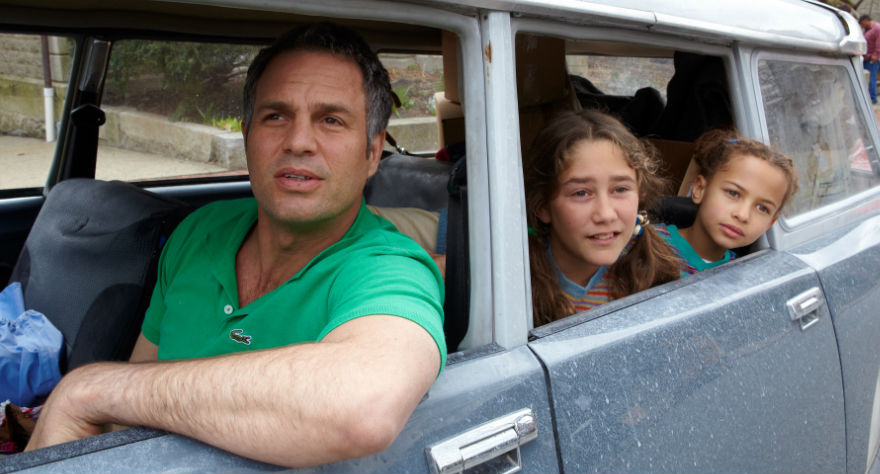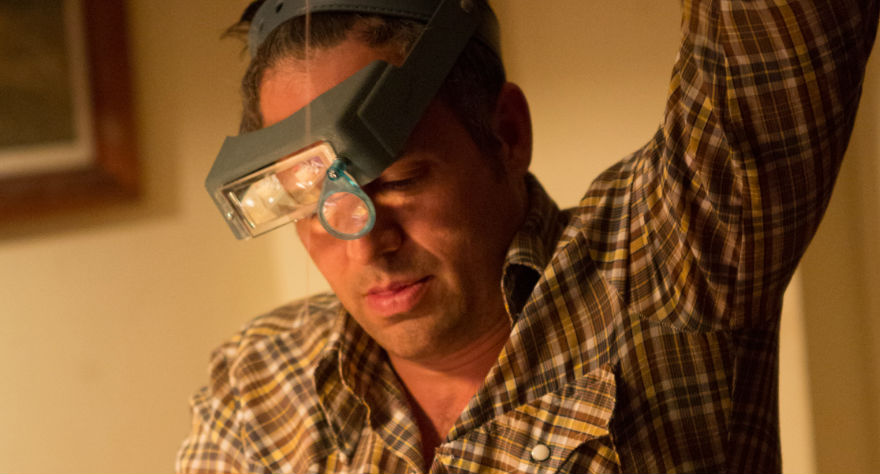Maya Forbes On Mark Ruffalo, Zoe Saldana and ‘Infinitely Polar Bear’

Mental illness never looked so adorable as it does in Infinitely Polar Bear, Maya Forbes’ true-to-life family story about her upbringing in 1970s Boston. The film is an homage to her father, played by Mark Ruffalo, a manic-depressive bohemian type with a big mouth, a big heart and a voracious appetite for making others happy. He’s tasked with taking care of his two daughters while his wife, Maggie (Zoe Saldana), goes off to finish an MBA program. Infinitely Polar Bear isn’t a dreary family drama about a mentally ill father, but a gentle ode to a family man who, despite a difficult condition, kept his family together.
I spoke to Maya during her visit to San Francisco about the film she says she’s been preparing her whole life to make and the strange business of teaching two people to act like her parents. Infinitely Polar Bear is out now.

So what you’ve done here, really, is tell your family’s story, which isn’t entirely flattering, to thousands of people. Almost everyone’s had an emotional reaction to it and enjoyed the film. That’s got to make you proud.
I’m really happy because I wanted to humanize this issue and tell the story of someone I really loved, who was manic-depressive. I feel like you don’t see that a lot, someone who’s struggling and is a difficult person, but still has wonderful qualities. I’m also very happy to tell the story of my mother because I’m very proud of her.
Some actors, when they’re portraying real people, take the approach of not researching much at all and just playing the character to serve the story. Others research as much as they can. What was the case with Mark?
Both Mark and Zoe wanted to know as much as they could. Zoe wanted to meet my mother, and she talked to her a few times. I gave her pictures, letters my parents had written. She just wanted to dig into that as much as she could. My father died in 1998, so he wasn’t available, but Mark started to have dreams about him where my dad would give him notes. With him I shared video of my father speaking. Mark had never done a character from this milieu before, so we talked a lot about the way Cam enunciates—he savors the words he says. Mark’s often cast as characters who mumble more, but here he needed to speak crisply. They both wanted as much guidance as they could get because we wanted to make the world we were building palpable.
You’ve said that you’ve been preparing your whole life to make this movie. Were you emotionally prepared for this process? It’s a little bizarre, teaching people to act like your parents.
It’s really interesting. People ask how I feel about “exposing my life.” I think of it as sharing rather than exposing. It is a lot to put out there, and I never wanted to be self-indulgent, which is why the film is so lean and funny. But I wanted to also make it an emotionally immersive film. I’m so happy people responded to it the way they did, because if you put yourself out there and people say the movie sucks, it’s like they’re saying I suck! [laughs]
There’s a shot near the end of the film where Mark and Zoe lean on each other in an interesting way during a very emotional conversation, almost in a huddle rather than an embrace.
That was something I always saw in my head. It was an expression of, we’re together, but we’re apart. We’re two roots of a tree. It was divisive, that shot. People thought it looked weird. The other part of it is that, when you’re a kid, you don’t want to look over and see that! [laughs] You don’t want to see your parents standing like that and crying! It’s embarrassing!
I thought Mark’s physical performance was particularly good, how he occupies space and moves around a room.
Sometimes I feel like his eyes and his body are doing different things, and that’s really great. There’s this tension between them. We talked a lot about the movement of this character. He’s a theatrical person. When he sighs, it’s heavy. He wants you to know, “I feel really sad right now, and you should feel sad for me.” [laughs] There are also all these ways Cam lights his cigarette. In my father’s era, they went to the movies and saw guys like Jack Nicholson and Jean-Paul Belmondo and Steve McQueen. There was that era of cool guys, and I think there’s a little of that in Cam’s character as well.
I found the set design to be incredibly immersive.
Thank you! I wanted it to be immersive. I had a bunch of pictures we used as a visual reference. My production designer is from a similar world, so I gave him three pictures and he knew what I was looking for. There were always layers of stuff. Every wall was covered in art. We had a door with slats, and any card we got would go into those slats. There was a lot of texture to the world. My aunt kept a lot of my dad’s stuff, so a lot of the things you see in the apartment are actually his. That’s indie filmmaking! Way too indie! [laughs]

This movie kinda feels like a mom and pop shop. You’ve got a lot of your family members involved.
My husband is the producer and plays that loser guy Maggie drives to New York with. My daughter plays me, essentially, and it was wonderful to work with her. My oldest daughter makes a cameo at the end. My sister wrote the song after the end credits. My aunt drove my dad’s stuff to set in her van, and the guy who plays the money manager who gets punched is my cousin, who actually is a money manager! [laughs]
What will this movie mean to your family as the years go on? Will you watch it annually or something? [laughs]
I don’t know! That’s the funny thing. Sometimes when you’re sitting on an airplane, everyone’s watching the same movie. What’s it gonna be like if everyone is watching my movie? It’d be weird. I don’t know what the movie will mean to me or my daughters.
Did unexpected themes or ideas surface in the story once you started shooting or after it was finished?
Yes, they did. I realized I’d never thought of how theatrical my father was. I was talking about the heavy sighs earlier. I realized my dad was in a movie of his own mind, the movie star of his own life. I also learned about mental illness. When you have a tendency toward mania, you get ramped up by stimulus. It was true that my dad couldn’t go to New York City. It was so hard for him to deal with all that stuff coming at him. I feel like I understood a lot more what he dealt with and managed to overcome to take care of us. There was no way he could deal with the pressure of an actual career. I gained a lot of understanding about what he struggled with.
I love how many women are in your movie.
Thank you. I didn’t know until later that my movie was considered diverse because it had 50 percent women. It wasn’t a conscious thing for me; I just had all these characters I wanted to populate the movie with.
Women make up half of this country, but they’re treated as if they’re minorities in movies!
I know! I feel like there’s a genre no one talks about: the “woman-less” movie. No women at all. I feel like there are so many movies like that. It’s crazy.
A lot of the time people with mental illnesses are portrayed as scary people. I love how likable Cam is. It’s clear, even when he’s angry, how much he loves his family.
When my kids were little, I remember somebody telling me, “Never lose your temper around your children.” I’m not a robot! I want my kids to see me as a person! I thought of my dad. He would have a temper, but he’d apologize. Did I love it? No, but who wants to walk around with someone who’s on their best behavior all the time? I want to see real people in all of their horrible glory. That’s the thing with mental illness; sometimes it seems like they’re saner than the rest of us. They’re not playing along with things that don’t make any sense. That line between where mental illness is and where sanity is has always been very interesting to me. It’s a confusing line.
Talk about killing your darlings.
The scene that was the hardest for me to leave out was near the end, between the scene where Cam and Maggie are crying and the goodbye scene at the school. Cam and the girls are driving back from New York after a weekend of staying with their mother. She has a boyfriend, and they don’t like that. Cam is totally understanding and says, “Mommy tries so hard. She wanted things to go differently.” He was so compassionate in that scene, which was something I loved about my father. For whatever flaws he had, he was so kind to other people. He was so understanding that he was hard to live with. The scene ended up being confusing because people didn’t know where they were coming from or where they were going to. I loved it, but it seemed unnecessary.
I like how fluid the movie is, tonally. The laughs bleed into the serious scenes and the funny scenes often carry some heavy emotions.
Mark and Zoe and I were trying to go “life,” you know? I’ll be crying one minute and laughing the next, and it’s all rolled up into one mix of emotions. It was in the script that there’s a lot of humor, and we tried to be true to that in the performances. In the editing, you have to keep playing with that tone. You want it to flow. It is a balancing act with the tone.
I love how Cam is always tinkering with stuff.
He’s always trying to fix things. My father was always trying to fix things, but he could never fix himself. That was moving to me. Anything that was broken had his name on it. It’s funny because Mark Ruffalo is like that, too.
Are you and your husband going to co-direct your next film?
Yes, we are. We’re so excited. It’s for Jack Black, and it’s based on a real story. There was a documentary called The Man Who Would Be Polka King, about this guy who came here from Poland in the ’80s to be a polka sensation. He did become a polka sensation in Pennsylvania, wearing these bedazzled rhinestone costumes. He also ran a Ponzi scheme. It’s a true-crime comedy with polka music and dancing! Jack’s a great actor. You really feel for him; he’s got a great vulnerability.
